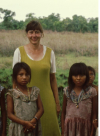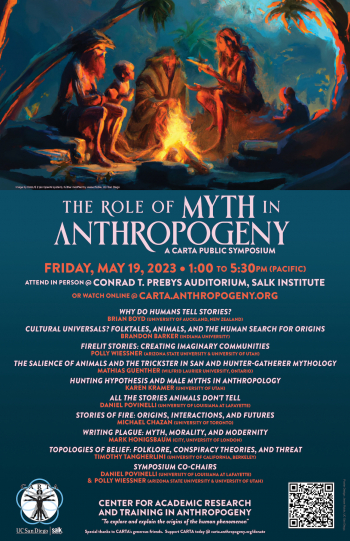The Role of Myth in Anthropogeny
Daniel Povinelli, University of Louisiana at Lafayette
Polly Wiessner, Arizona State University & University of Utah
Summary:
The human penchant for storytelling is universal, early-developing, and profoundly culture-shaping. Stories (folk tales, narratives and myths) influence the costs of social transactions and organize societies at every scale of human interaction. Story as a mode of communication is also unprecedented in the animal kingdom: although we are compelled to tell stories about other animals, they are not likewise compelled to tell stories about us (or anything else, for that matter). Even scientists who attempt to objectively understand human origins are destined to craft those explanations as stories, often with narrative and/or mythic overtones. From the domestication of fire to the emergence of cooperative hunting to the evolutionary origins of human cognition, our understanding of the human journey is deeply influenced by stories embedded in our cultural histories. Even our ability to manage urgent human problems such as global health and climate change are affected by the stories and myths humans choose to tell. This symposium explores several stories about how the evolution of story-telling shaped, and continues to shape, the human epoch.
Media for each talk can be played by clicking on icons in the table below, or by clicking on the individual talk titles below and then the attachment file at the bottom of the page.
| Speakers | Media | Session |
|---|---|---|
 Gerald Joyce  Daniel Povinelli |
|
Welcome & Opening Remarks |
 Brian Boyd |
|
Why Do Humans Tell Stories? Why are humans a compulsively storytelling species? Why especially do we invent stories, why do we tell one another stories that both teller and audience know to be untrue? Why do many of us come to believe some invented stories? What difference has our compulsion to tell stories made to us as individuals, societies, and a species? How do we understand stories so seemingly effortlessly? |
 Brandon Barker |
|
Cultural Universals? Folktales, Animals, and the Human Search for Origins For more than a century, folklorists have indexed a vast number of the world’s folkloric narratives according to varying structures (i.e. tale types) and to discrete elements (i.e. motifs) that commonly appear across cultures. This talk will introduce and analyze several examples of motifs indexed in folklorist Stith Thompson’s system as, "A1200 — A1699. Creation and ordering of human life” and “A1700 — A1799. Creation of animal life.” I will highlight certain narratives that feature stories of... read more |
 Polly Wiessner |
|
Firelit Stories: Creating Imaginary Communities Some 350 to 400,000 years ago when our ancestors gained control of fire, the day was extended to provide many hours for social interaction, undisturbed by economic activities. How were those hours spent in societies that only had firelight after nightfall? In most preindustrial societies, music, dance, healing and storytelling fill the darkness. Myths and legends create common understandings on such matters as the origins of humans, social groups, rituals or features of the landscape. Hilarious... read more |
 Mathias Guenther |
|
The Salience of Animals and the Trickster in San and Hunter-gatherer Mythology Animals and tricksters are highly prominent beings in the mythology of the San Bushmen of southern Africa, as well as of hunter-gatherers in other regions of the world. Their actions and interactions provide the plot lines for most of the stories people tell about myth time (a time that, according to their world view both precedes historical time and continues on, and is accessible to people, up to the present). Why are these two beings so preeminent in San mythology and storytelling? Is there... read more |
 Karen Kramer |
|
Hunting Hypothesis and Male Myths in Anthropogeny The hunting hypothesis proposes that the dietary shift to meat procurement was the catalyst favoring a suite of transformative human biological and behavioral adaptations. Evolutionary changes in the human diet are associated with the emergence of food sharing, the division of labor and pooled energy budgets. With cooperation at its center, this complex of traits sets hominins on a path distinct from our closest relatives. The historic weight given to hunting as a prime mover in the social and... read more |
 Daniel Povinelli |
|
All the Stories Animals Don’t Tell Here’s a bit of human folklore: Humans have been telling stories about animals as long as humans have been telling stories. In other words, for a really long time. One particular story humans tell about animals is the one about how, with enough care and patience (and perhaps enough scientific ingenuity) humans might one day listen to the stories animals themselves have to tell. Some folks see this story as nonfiction, a truth about animals manifest in the dance of bees, the grunts of monkeys,... read more |
 Michael Chazan |
|
Stories of Fire: Origins, Interactions, and Futures As the response to global warming leads towards a fundamental recalibration of our relationship to fire it is timely to look back into deep time at the origins of our entanglement with combustion. This brief talk draws on my experience working on the recovery of early evidence for human use of fire at the sites of Wonderwerk Cave, South Africa and Evron Quarry, Israel. I will argue that we should not think of an origin of human use of fire but rather of an emerging relationship between humans... read more |
 Mark Honigsbaum |
|
Writing Plague: Myth, Morality, and Modernity In the foundational texts of Western civilisation (the Bible, Iliad), plagues are symbols of divine retribution, signifying Godly displeasure with human misdeeds. But in Thucydides’ classic account of the mysterious plague that swept Athens in 430 BC, Camus’s La Peste, and Emily St John Mandel’s Station Eleven, literary accounts of plagues and pandemics are also morality tales and metaphors for the dissolution of the social bonds necessary for the functioning of modern societies. In this talk,... read more |
 Timothy Tangherlini |
|
Topologies of Belief: Folklore, Conspiracy Theories and Threat Political, financial and environmental crises coupled to the rise of social media have, in recent years, created a perfect storm of mis- and disinformation that leverage long standing reservoirs of belief within and across communities. These stories on social media mirror face-to-face storytelling and other storytelling environments in that they allow for the negotiation of cultural ideology (norms, beliefs, values), yet they also change the scope, speed and amplification of that storytelling.... read more |
 Polly Wiessner  All Speakers  Pascal Gagneux |
|
Question & Answer Session and Closing Remarks |
If you enjoy this event, please consider supporting CARTA's quest to explore and explain the human phenomenon.


